Uniting Business And The Arts With Jen Guillemin And Wendy Swart Grossman
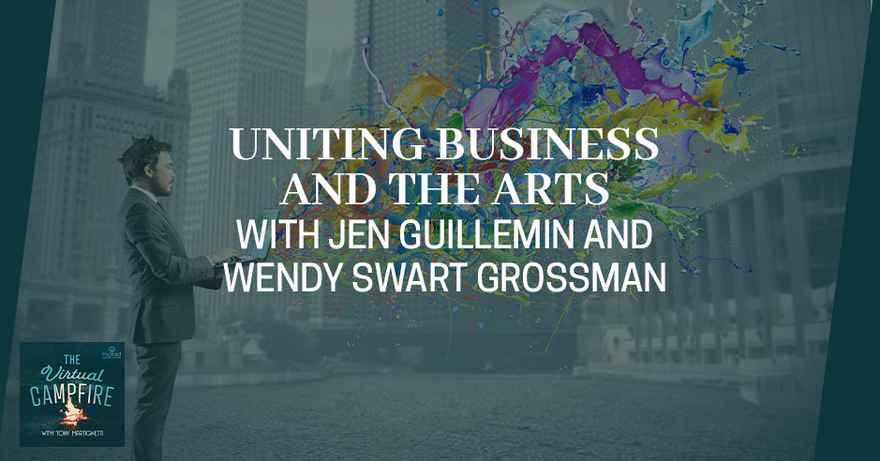
What do business and the arts have in common? Some might say nothing, but the co-founders of Creative Re/Frame Jen Guillemin and Wendy Swart Grossman have a different answer. They recognize that business needs art and art needs business. Their mission is to bring the two together to create a powerful and balanced world for both. In this episode, Tony Martignetti talks with Jen and Wendy about their career directions, what they do and why it’s important. They explore the importance of combining talent, finding your inner artist, the importance of the creative arts in the business world, leadership, and much more. Join in as they delve into Jen and Wendy’s plan to make the world a better place for all.
---
Listen to the podcast here:
Uniting Business And The Arts With Jen Guillemin And Wendy Swart Grossman
It is my honor to introduce you to my two guests, Wendy Swart Grossman and Jen Guillemin. Wendy is a creative practitioner and consultant with a background in US and South African Presidential campaigns. She brings her expertise in building effective partnerships, strategic planning, board development, measurable outcomes, communication and workshop facilitation to the table. She has held positions at Harvard Museum of Science and Culture and the Graduate School of Design. As well as the Science Museum in London, UK, in scores of NGOs, nonprofits and social impact businesses nationally and internationally. She's also an Adjunct Faculty member at Boston University within the Graduate Arts Administration Program.
Jen is an arts advocate and creative problem solver. She is on the Northeastern University Faculty teaching and mentoring Art and Design students in their world-renowned Co-op Program. She has expertise in higher education administration, building effective partnerships, strategic visioning, curriculum development and cross-sector collaboration. Her professional collaborations have led her to teach in prisons and homeless shelters to create community-engaged projects in Boston. Jen's passion is to help people identify and focus personal values, creative interests and unique gifts in order to achieve their educational, professional and personal goals. Why are we bringing these two individuals together? Wendy and Jen are the Cofounders of Creative Re/Frame, a consulting practice dedicated to integrating the arts in entrepreneurship and innovation spaces on university campuses.
---
Wendy and Jen, I want to welcome you to the show.
I can feel the warmth already.
Thank you, Tony.
Honestly, I'm thrilled to have both of you on. Having two guests is something that we don't normally do but with this dynamic duo, we are sure to have a winner on our hands. The show is all about sharing the stories of amazing people that have gone through a transformation but also have done amazing things in the world. We do this by way of giving them a forum to share their stories and give insights as to why they're making an impact. The way we do that is by starting to share their flashpoints. These are moments in your story that have ignited your gifts to the world. Along the way, we're going to stop as you share your story, what you're called to share and see what's showing up, trends, themes and things that we see. With that being said, what I'd like to do is we’ll give Wendy to start and go to Jen. We'll go back and forth and see how this plays out. Wendy, would you like to take it away and share some thoughts?
Thinking about the different flashpoints, we're all these interesting combinations of personal and professional. Where does it start? I've been a peripatetic person since I was a little kid, traveling and living before I had a chance to have a voice. Growing up mostly in Minnesota, Long Island, then we moved to San Diego, California. We’re moving lots of different places before the age of twelve. I was always looking for community and connection. In fact, somebody asked me one time, am I interested in a community because I came from it or because I didn't come from it? For me, it was because I wanted to create it and be able to wrap my arms around where I was living. I continued to move around a lot. I put on my bicycle for three months, lived out of a backpack for six months and always looking for where I could connect. Right out of college, I worked as an organizer for the Purge Regional League. I was a student organizer at UMass Amherst as well as Bridgewater State. I also had to canvas to make my $78 every night. It was fascinating going around the middle communities.
On my bad days, I was begging for money. On my good days, I was righteous and these people are lucky that I'm here giving them an opportunity to invest in something that they should be investing in. I was an organizer for Michael Dukakis, living in Steubenville, Ohio and being up at 6:00 in the morning, organizing the shift breaks at the steel mills. In Stevens Point, Wisconsin, I’m working at the paper mills during their shift breaks. I was curious about who wants to get involved, what compels people to get involved in politics, what they care about and their purpose? That's the background of my long career that started somewhere in the Triassic period. It's changing and evolving as I'm going. Every time I’m gathering different skills along the way in the next iteration than the chapters of the book, that led to Creative Re/Frame.
Our creative selves and the combined skills that we have with other people would make things better.
I'd like to think of it as 4 C’s and you had 2 C’s. You mentioned community and connection, which are very powerful. Community and connection are important. There are other things that you talked about that are there. Curiosity, creation and creativity, which I know are what you're doing. You’re very creative. I love where you're coming from in terms of that spot. It’s a powerful start. Let's switch over to Jen for some of her early take on this question.
Tony, thank you for having us. We're excited to be here. I was thinking of Wendy's story and how her life might be described by movement. My life might be more described by deepening and spreading these roots. While she was moving, I was deepening. I grew up in a small town in Upstate New York. The house that I grew up in, my dad still lives in and I spent my whole life there. I have a very clear sense of home. What defined home for me was a very rich, creative environment that was centered around community and connection, as you point out.
My mom was a voice teacher. She used her music to help people find their personal joy and express their emotions in all of their forms. In our front dining room, we set the family piano. My mom will host her students and they would come in. She also taught at a nearby college but had private students who would come into the home. Our home was filled with music. People would come in oftentimes feeling a little beleaguered from the day and they would leave our house with feelings of joy. I saw the benefit of this kind of existence of what my mom did when she died of cancer. In the last few weeks of her life, she had people. She was born around the Christmas holiday. She died around the Christmas holiday.
Christmas to her was always a big deal. She was agnostic and not religious, but she loved the fanfare around the holidays. At the time of her death, every day, people would come by to her house to deliver these little special gifts. They would come with all of these voice students that she had over the years and people in the community. They would deliver little Christmas tree ornaments with stories attached. There was a basket that one of her friends arranged in the back porch where every day we would go and receive these baskets of ornaments. My mom would go through them one by one. For me, that was the embodiment of what it means to intersect relationships and meaning through the arts.
When I moved to Boston, ironically, I ended up finding another parental figure who ended up being my father-in-law. His name was Sidewalk Sam. He did public art in the City of Boston, big chalk drawings and bringing people together. You may have heard of Sidewalk Sam. He was known in the Boston area for decades for doing these kinds of public art projects. I had the opportunity to get involved with him. I witnessed the magic of what it takes to bring people together and experience the arts together. That helped to define my career direction, where I ended up getting a job at Boston University. I had a few different positions but ultimately, I was led to the art school where I was working with young artists. In the time that I was working with the young artists, I was deeply invested in them as people. I had gotten a Master's in Arts Administration. As I started talking with the artist, I ended up feeling like I'm doing a lot of listening. I'd rather be a trained listener. I went back and got a Master's in Counseling. These two worlds of Counseling and the Arts Administration came together with me.
What I was finding through these years of working with students is that they had these amazing talents and abilities but we weren't doing anything to help prepare them for a life in the arts. Many of them were graduating. They didn't even have resumes or had no idea about how they would take their passion for painting or later on, Oboe performance. I ended up working with music theater and visual arts eventually. There was no understanding of how they might continue to lead a creative life in the arts. This was something I cared deeply about, mostly because I cared about the people and the community. I was invested. I started to experiment with offering various programming for students to gain some skills and it was at this time where I met my fabulous colleague, friend, collaborator and amplifier of all that is good, Wendy Swart Grossman. I was sharing with her the work that I'd been doing at the College of Fine Arts and this interest of mine. She also had an interest in teaching. I taught a class in Arts Administration and the head of the department invited me to propose a class.
Originally, we thought it would be an interesting combination of our skills where we'd have artists as the activist. We are all ready to propose this curriculum. We went and chatted with the director of the program. He brought to light that there was this whole new thing popping up on how can we morph this into cultural entrepreneurship, which was mind-blowing at the time for us but then it gave us a much more concrete series of things that we could hang our combined skillsets onto from Jen's incredible knowledge of the whole art world and my get-things-done mentality.
The time has come for us to stop pretending that we can live in a world that’s devoid of our expressive selves. We’ve teased businesses apart from what it means to be human.

I don't want to take too much of your thunder because what you and Jen shared is powerful. It's this element of how art at the core. It's like unless you're dead, art somehow emotionally touches you. It's the soul. It is where it hits when you can get that for every one person who can see and feel that element of touching the soul. Connecting that with something allows them to express it in a way that creates something powerful from an entrepreneurial venture or to a business aspect. It's two worlds colliding and a beautiful combination. In some ways, that's what I'm seeing. Wendy's got a really strong, beautiful soul but she also has this good business acumen, which I can already see, that activism. The amplifier is the word that was used because you need that for someone who understands the way to get a message out and also the power of art to soothe the soul.
That's such an interesting combo because of the artists’ attention to the craft and the importance of beauty and perfectionism. There's that tipping point where when is it good enough to get out there and to be like, “It's good enough. Now push and go.”
You both met through being in the university system.
We met through our kids.
Wendy had moved to the neighborhood. We kept popping up in each other's lives all over the place. It was destiny that we were going to meet. Our kids became friends. That was our original conversation but we began teaching together. That was how we got to know each other.
When you came together and decided, “There's something here that we need to do together.” Tell me about the early days of like, “How do we make this something that's viable?”
This is the cool part about getting older. It's like, "I want to work with people I like, have fun and cool synergy with." When Jen and I met, literally our kids were in second grade. Now they both graduated from high school in 2020. We met and it's like, “Who is this person? She's fascinating.” We never stopped getting enough conversation. Jen being Jen. I still remember Jen Guillemin. We went out for a drink at the Vietnamese Restaurant in Coolidge Corner. Jen is the kind of person who when you're talking to her, she's looking at your soul. You would think you're the most important person in the world.
She asks you the questions like, “How’s your spirit? How would you be best fulfilled?” The way Jen moves in the world was like a bomb to the soul. I want to do something that's important and meaningful. I've always loved to teach because I'm a frustrated standup comic. I was like, “Would it be cool if we could figure out something?” We're both creative people and I'm like, “We can figure this out.” Jen is like, “I happen to work at a university.” We were friends first and tried to figure out how to work together to deepen our friendship and have fun. That's all I remember anyway.
What I wanted to say is there is something powerful. As Wendy says, finding people that you enjoy being around and working with. We created this course together, which was wildly popular and filled to capacity every semester. It’s still running. What we found is we would start someplace, but by the combination of skills that we had, we would always make things better like I would say something and she would say something. We were in one place but we could go much further by working together. We started to see with what we were teaching the quality of the teaching, what we were able to produce in our writing, how we're able to support our students and it would grow so we would come up with an idea and it makes fun to be able to do this. This was the evolution, years of working together, collaborating, writing, publishing, presenting brought us to this place of, “We have created something and seeing demand for what we're creating. Let's start Creative Re/Frame.” That's what we did.
One of the real catalysts for the business launch was we were asked to give a TED Talk together, which was like, “It’s a lot. You’ve got one person on stage but here we are again.” That was the most painful and wonderful process because we had a deadline and a stage that we were going up to. It was talking about fear. This is going to go on and live longer than us because up until that point. We had a shared Google Drive with all of our students that called us JenDy. It’s JenDy Drive. Then we realized that this is something bigger than JenDy. That's when we came up with the whole idea of Creative Re/Frame. It's an idea at the TED Talk, which is the TEDxBU Talk in 2019. From there, it's like, “If not now, when?”
What do you have to lose besides that?
Don't be afraid of people who are different because that's where the conversation gets fascinating.
It's $500 to start an LLC. That's what we have to live.
Speaking of numbers, what's powerful about the combination of each together is you prove that 1 plus 1 does not equal 2. It equals more than three and that's for sure. It's the power of bringing people who are very different in nature but in reality, you guys complement each other so well. I want to focus a little on something that is going to be a taboo topic. What about when you guys have differences? Have you ever had a difference in how you settle them?
We place a high value on harmony. When things are a little off, somebody snips or somebody does that. We give each other a little space initially but we always talk about it and address it. It never leaves anything. It's simmering. That has been such a gift because I know I can be honest. I always feel safe in honesty and trust that whatever has happened, we both have a shared commitment to getting back to our harmonious place because that's where we can do our best work.
It comes up at different times and usually around writing projects because we have very different styles. It’s learning how we do it. I'm the person who can go and throw up all over the page. Jen is the cleanup girl. She's like, “I can put the structure out there and get a start. I'm not afraid of the blank page.” Jen will give the semblance of the order, then I'm like, “Good enough. Now, we need to push it out there.” That's a hard process anyway to be a writer and to do what somebody asked. On the plus side, it pushes you further. Peer review is boring but we did it. We’ve got articles, journals and another chapter coming out in a book.
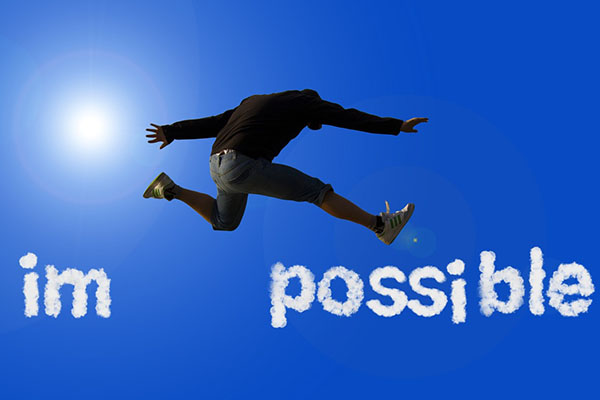
It’s about conscious capitalism of all things, which we're excited about. We feel that this is a very important place for the arts to be. We're excited.
I want to delve into this a bit more about what is it that truly lights you up about, where your work is headed and this topic of bringing the arts and business together? It is powerful and badly needed in this world. I want to know some of the messages that you want to share about the work you're doing because it's beautiful.
Our time has come. We've been talking about bringing meaning to the marketplace. How do you get businesses to break open instead of the profit but it has to be the triple bottom line of the people and the planet? This has been the drumbeat that's been out there quietly for so long, the world explodes and all of a sudden, capitalism isn't working. If ever there was a time, it's now. Things are happening very fast. How can we help give people some frameworks to push forward these questions? How do we bring creatives to the table? Artists are not just on the walls but artists at the tables helping and getting both the business world to see the importance of the creative practitioners. The minute I create, a practitioner walks into the room. There's a lot more room for cross-disciplinary conversation. By the same token, how do we give the skills to the creative practitioners and artists? They feel and know that they have the skills, language and vocabulary that they have a right and need to be there?
The time has come for us to stop pretending that we can live in a world that's devoid of our expressive cells. We've teased businesses apart from what it means to be human. We act like that's going to be okay and going to work. We're seeing that it doesn't work. Fundamentally, people are not happy working in environments. It does not feel meaningful to people to work in environments that are devoid of any human connection. We also see that it is not sustainable for us to live in a time where we're not factoring in people on the planet. That time is over for us.
We see the potential for the arts to open up those conversations and connections. To give you a concrete example of some of the work that artists can be doing, I'm thinking of the Boston Medical Center. There are theater performers who are teaching doctors and medical students about cultural awareness and doing role plays. Visual artists can come in and you can see that the creative placemaking is a whole thing where you can have artwork that is in a community that can be an economic driver to bring people together within that community and create spaces that people want to be in. You see the role that music plays.
We're only beginning to ignite our imagination as to where this could go. We see so much possibility. Our goal is to work with universities because we see them as a way to educating people open up their imaginations. That's why we're looking at entrepreneurship and innovation spaces that are already designed to do this very kind of work to be thinking about the jobs of the future. First, what we have to do is we've got to make sure the artists and creators see themselves as being part of that conversation in space too. It is not only for Engineering and Business students. It is when these cross-disciplinary teams come together that powerful change can happen. We are about powerful change for the future.
That's one of our roles. Creative Re/Frame is working in residence at Boston University BUild Lab IDG Capital Student Innovation Center. Our role there is to infuse artistry and creativity into some of their set programs. For example, The Idea Conference came up on February 27, 2021. We are now bringing it all online. How do we take the Regional Student Innovation Conference and make sure students from College of Fine Arts, Public Health, Law Schools, Bunker Hill Community College and Suffolk University? Not just BU because we’re trying to be very regional that everyone is welcome. We're going to infuse arts and creativity into conversations around where capital and ideas came from and create these conversations that are much richer because they are cross disciplinarily. By the work that we're doing, we used that as an example for the students as well as the staff in BU to see, “It’s okay. This is already happening.” We show by doing.
I think about a lot of the things that are already happening and the direction it's headed. First of all, when I was a Northeastern student, I took Music Therapy. It was one of my favorite classes, even though I wasn't that discipline. I decided I was going to take something as an elective. That was my favorite class because Music Therapy was something that tapped into this element of how music is being used with autistic children and Alzheimer's patients. I thought of the power of music and the impact it can have.
The music in neurology is huge. A colleague of mine is the Music Therapist at Great Ormond Street Hospital in London. The children don't stay as long in the hospital. You can't deny the data.
It's not very widespread but it's been practiced for a long time. It's amazing. What came to mind for me is it's not just about bringing the artist and the non-artists together but everyone is an artist in their own way. This is one of my favorite things to think about. They use different brushes and implements but everyone unleashing their own artistry in their own way. That's something that I connected with when you guys talked about this. It's powerful when people can start to see that in whatever capacity. They can be more creative and see that thinking come alive. The last thing that came to mind was this overused term, which is disruption. Everyone disrupts. It’s by bringing together these disciplines around, bring some people who think differently into the room and then watch what happens.
It does not feel meaningful to people to work in environments that are devoid of any human connection.
Don't be afraid of people who are different because that's where the conversation gets fascinating.
Most of the workplaces that we've had over many years have stunted a lot of these powerful voices that could have a lot of great ideas of the creatives, even the quiet voices. We need to have more voices being heard. Expressiveness is what's important. The work you're doing is very much in line with having more of these voices being heard. That's what gets me excited about it and makes me want to be a champion for the cause.
Thank you for that. We teach workshops for both businesses and students around this framework. We talked about make like an artist, care like an activist, strategize like an entrepreneur and implement like an organizer. We see the making and caring has been taken for granted in some cases and we want to elevate that. If you want to be successful in the creative professions, you have to be able to strategize and implement. Businesses do for the future are also going to be able to think about what they're making and how they're caring if they're going to be sustainable in the future. We think that this blended model is important. It can apply to our own lives. When we access our creative selves, we are probably our best selves.
I'm going to move to the final question, which is seemingly arbitrary but inquiring minds are dying to find out. What is one book that has had a major impact on your life and why?
When I was in graduate school at Tufts University studying Urban and Environmental Policy, I was digging deep into volunteerism based on my experience working on campaigns both for Nelson Mandela as well as the White House under the Clinton Administration. Anyway, being a volunteer organizer, I was curious about all of this. The book that stood out for me at that point was Habits of the Heart by Robert Bellah. It talks about why do people get involved and what makes for a happy life. It all comes down to the connection to community and the more strands that you have. It made me talk about how do you build a happy life. You can't go after happiness just for happiness but it's a side benefit of building a rich, connected life. It helped me to frame my work and how I move in the world.
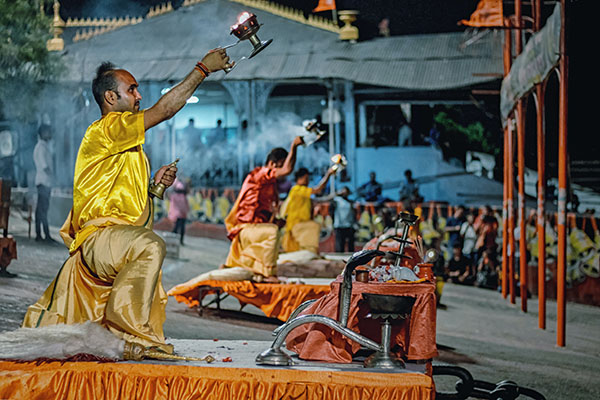
I'm going to definitely be checking that book out for sure.
It's still in print. It's an oldie. It came out in the 1990s.
My book budget has gone up by droves since I've started this show. It's ridiculous. My wife's going to kill me.
When you asked the question, I had one that’s sitting on my shelf that I wanted to share. It's The Culture of Possibility: Art, Artists & The Future by Arlene Goldbard. I'm going to read a little quote from this book because maybe it's timely, “If you begin to see culture clearly, everything changes from despair to possibility. Reconnect with those peak moments and you will understand that culture is the matrix of any human society. The powerful source of imagination, empathy, creativity and resilience needed to activate our innate capacity for a moral grand jury and social healing. If there's ever a time to hid those words, it is now.”
I'm grateful that you shared that. That was something that caught me. I'm touched by that. I need to get me a general Wendy to my Tony. Honestly, you guys are truly amazing. I'm grateful that you're doing the work you're doing. I'm glad that I was able to have you guys come on the show and share your brilliance with me and the audience. Thank you.
Thank you to you, Tony. Keep up the incredible work that you do.
I appreciate that.
I feel indulged to have this moment like talking to myself.
I want to make sure that people know where to find you. Where is the best location to find you on the web?
Go to CreativeReframe.com and find us, CreativeReframeNow@Gmail.com.
Sign up for our newsletter and follow us on Twitter.
Thank you again. Thank you, readers, for coming on the journey with us. Have a good one.
Important Links:
- Creative Re/Frame
- CreativeReframeNow@Gmail.com
- TEDxBU Talk
- BUild Lab
- The Idea Conference
- Habits of the Heart
- The Culture of Possibility: Art, Artists & The Future
- Twitter – Creative Re/Frame
About Jeannette (Jen) Guillemin
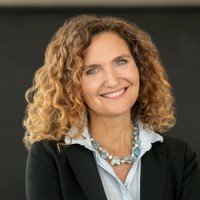 As a strategic leader, I channel creativity and positivity to build high-performing teams, to pursue purpose-driven projects and to collaborate with multiple stakeholders across sectors.
As a strategic leader, I channel creativity and positivity to build high-performing teams, to pursue purpose-driven projects and to collaborate with multiple stakeholders across sectors.
With a background in higher education, I have extensive experience in:
- thoughtful, innovative problem-solving
- program design
- implementation and evaluation
- career development
- teaching
- strategic planning
About Wendy Swart Grossman
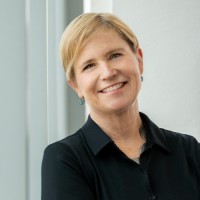 With a background in US and International Presidential Elections - clarity, communication, collaboration, and deadlines are my strength.
With a background in US and International Presidential Elections - clarity, communication, collaboration, and deadlines are my strength.
As a Creative Practitioner and Co-Founder of Creative Re/Frame, I am a node. A Connecter, Organizer, Thought Partner, Strategic and Visionary Advocate in all areas of arts integration into innovation and entrepreneurship spaces, nonprofit management, leveraging and cultural entrepreneurship.
But really? I am just trying to push forward the agenda of World Peace.
As an Adjunct Faculty and proud Union Member at Boston University's College of Fine Arts and the Metropolitan College in the Graduate Arts Administration Program I teach Cultural Entrepreneurship to graduate students giving artists the skills they need to launch their own businesses.


0 comments
Leave a comment
Please log in or register to post a comment